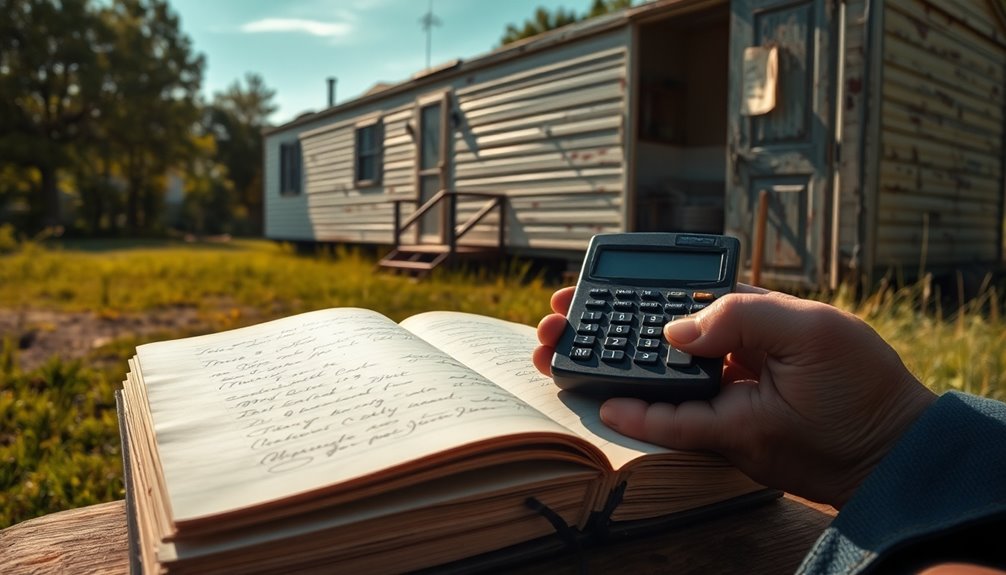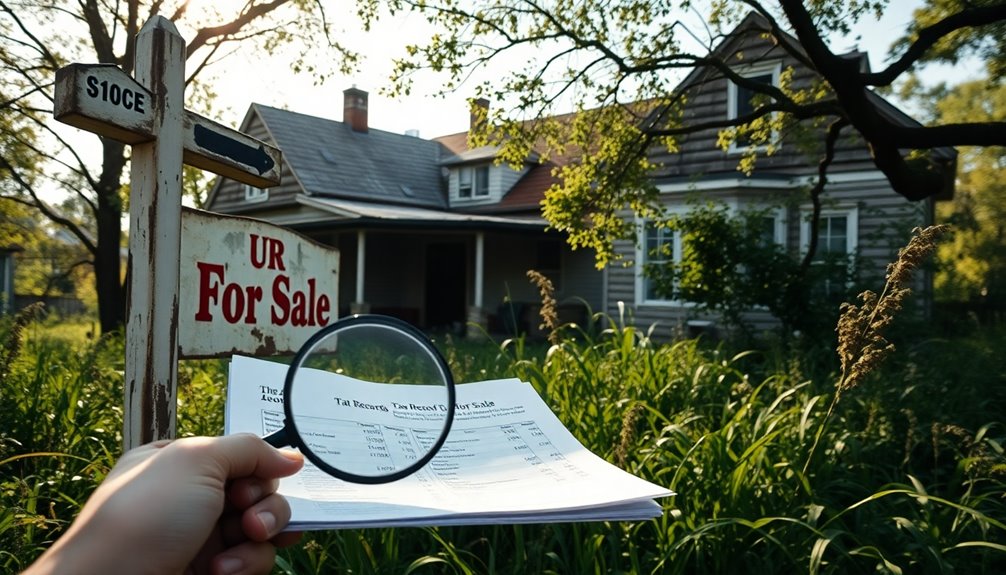To buy mobile homes behind on taxes, start by understanding tax liens and deeds. You can acquire tax liens at auction, often for low costs. If the owner redeems the lien, you earn interest. Alternatively, purchase tax deeds for immediate ownership, but be aware of outstanding liens. Always check local regulations, as procedures vary by state. Before committing, assess potential repair costs and ensure proper documentation, including tax status certifications. It's smart to build a network of professionals for support. Want to know how to maximize your investment and avoid pitfalls? There's plenty more to explore!
Key Takeaways
- Research local tax sale processes to understand specific regulations and types of sales for mobile homes behind on taxes.
- Attend tax lien and tax deed auctions to purchase tax liens or tax deeds on mobile homes with unpaid taxes.
- Verify ownership and check for any outstanding liens or mortgages that may affect the purchase before bidding.
- Prepare necessary documentation, including tax status certifications and bill of sale, to ensure compliance during the acquisition process.
- Assess potential repair costs and financial implications to make informed decisions and maximize returns on your investment.
Understanding Tax Liens and Deeds
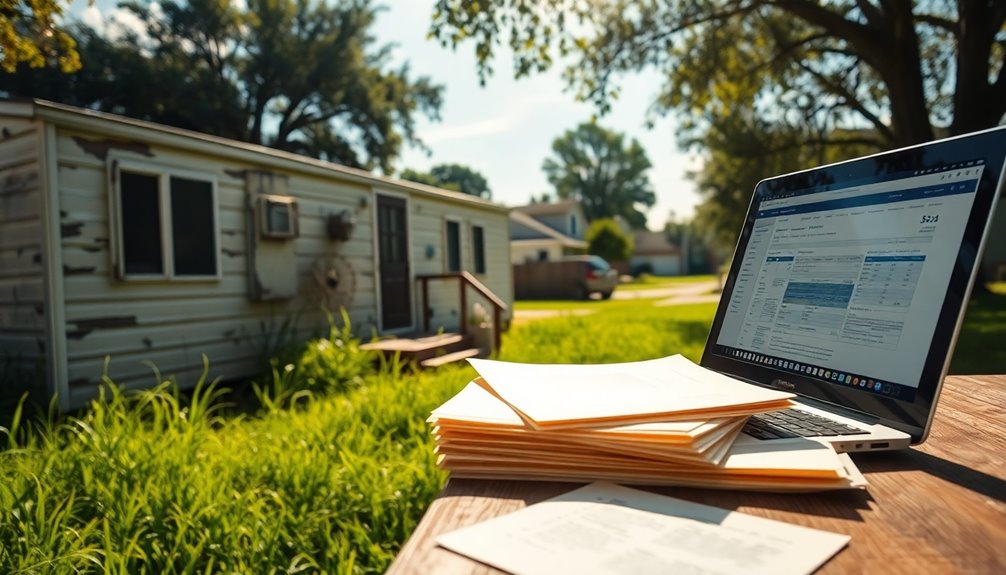
When you're diving into the world of purchasing mobile homes behind on taxes, it's crucial to understand the difference between tax liens and tax deeds.
Tax liens occur when property owners fail to pay their property taxes, leading to a lien on the property. You can acquire these liens by bidding at auctions, often for a fraction of the property's value. There's a redemption period during which the owner can pay back taxes, and if they do, you receive your money plus interest. Tax liens are often acquired at lower costs compared to tax deeds, with the potential to acquire properties for minimal investment (e.g., $500).
On the other hand, tax deeds are issued when a property is sold at auction due to unpaid taxes, transferring immediate ownership to you. Unlike tax liens, there's no redemption period with tax deeds, meaning you get the property outright once you pay.
The costs associated with tax liens are generally lower, but they come with the risk of the original owner redeeming the property.
State procedures vary significantly, so it's vital to familiarize yourself with the rules in your area. Understanding these differences will help you make informed decisions as you explore purchasing mobile homes behind on taxes.
The Tax Sale Process
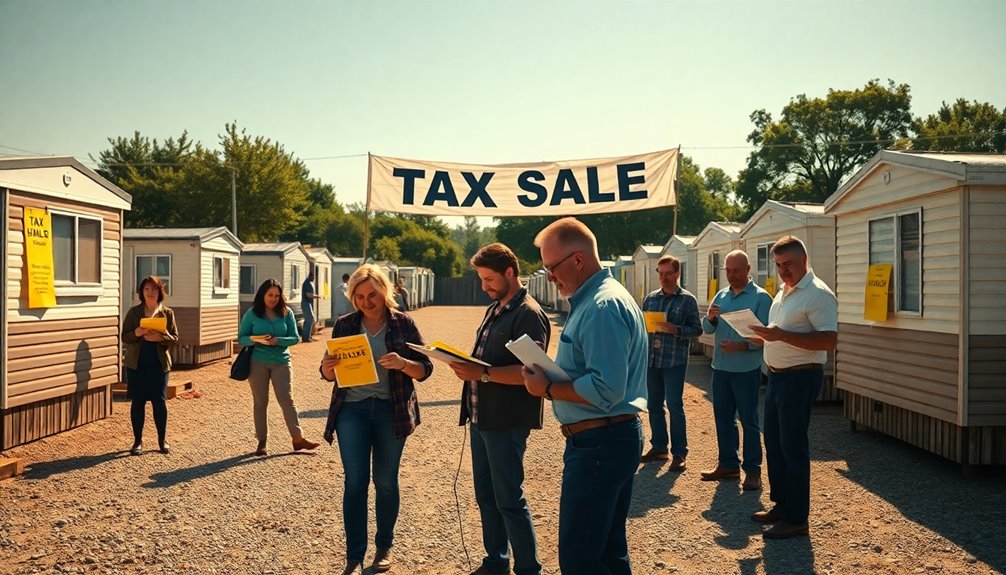
Navigating the tax sale process can be a rewarding venture for those looking to purchase mobile homes behind on taxes. You'll encounter several types of tax sales, including upset, private, judicial, and repository sales. Each requires specific documentation.
For instance, upset sales need a petition for confirmation and a decree of absolute confirmation, while private sales require certified copies of court orders. Before proceeding, ensure you have a bill of sale that details the home, including its VIN, make, model, and year. You'll also need a tax status certification to confirm any delinquent taxes have been settled. This certification is crucial if the mobile home was used as a residence. Additionally, be aware that sales tax exemptions apply to new mobile homes sold under certain conditions.
Once you've secured the necessary documents, including any lien releases, you can apply for a certificate of title. Submit all required paperwork, like the completed Form MV-1, to PennDOT for processing. Make sure to include any lien release signed by the lienholder, along with the VIN and title information. Paying off all delinquent taxes before the transfer is essential to avoid complications. Following these steps will help you successfully navigate the tax sale process.
Importance of Redemption Periods
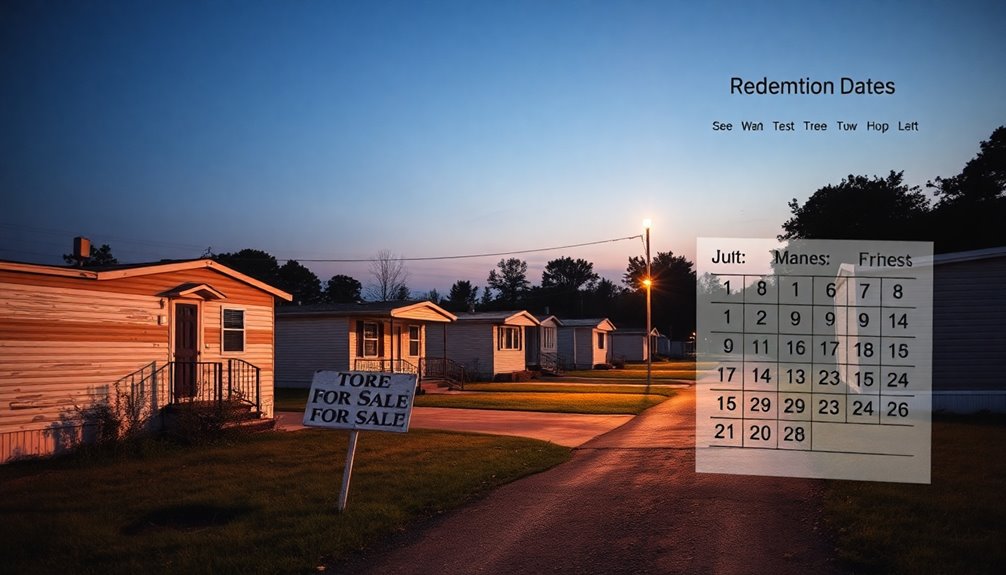
Redemption periods play a crucial role in the tax sale process, impacting both property owners and investors. These periods vary by state, with some allowing up to two years, while others might be shorter or longer. Understanding the specific redemption timeline in your target state is essential to strategize effectively.
For property owners, the redemption period is a final chance to reclaim their home by paying the delinquent taxes and any associated fees. You'll need to make your payment to the authorized official, like the county treasurer, before the period expires. Public notices usually outline this timeline and the redemption amount, ensuring you're aware of your options. Tax deed redemption rights may allow former owners to reclaim property within set periods, further emphasizing the importance of acting swiftly.
For investors, knowing the redemption period's nuances can affect your overall strategy. High redemption rates mean you mightn't end up owning the property, but you can still earn significant interest on your investment. Keeping an eye on the redemption status prepares you for the potential outcomes, whether that's acquiring the title or planning for resale.
In short, grasping the importance of redemption periods helps everyone involved make informed decisions, ultimately guiding your approach to buying mobile homes behind on taxes.
Tax Implications for Manufactured Homes
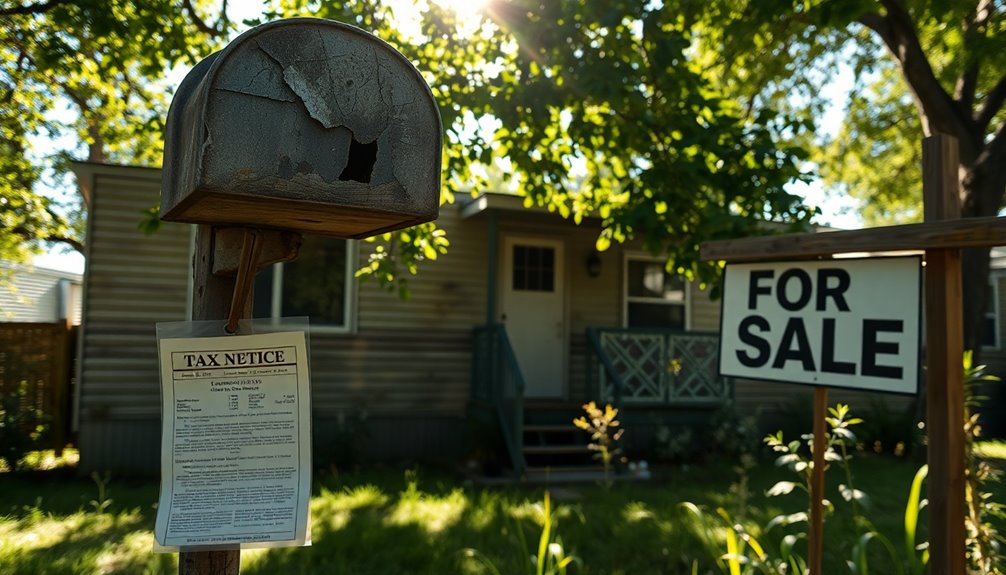
Understanding the tax implications for manufactured homes is essential for both homeowners and investors. You can benefit from various tax deductions and credits that apply specifically to manufactured homes. For instance, if your home serves as collateral for a loan, the interest on that loan is deductible, whether it's your primary residence or an investment property. Just remember, the total debt limits are $1,000,000 for joint filers and $500,000 for individuals.
Additionally, you can deduct annual real estate taxes on your manufactured home, regardless of whether it's on owned or leased land. Any property taxes paid at settlement are fully deductible in the purchase year. Furthermore, if you take out a chattel loan, you can still deduct interest on it as long as your home secures the loan.
If your home is subject to local property taxation, you might also qualify for exemptions, like the Homeowners' Property Tax Exemption. Moreover, don't overlook potential energy efficiency tax credits for enhancements like solar panels. If you sell your primary residence, you may exclude up to $250,000 in profits from capital gains taxes ($500,000 for married couples).
State Regulations and Variations

State regulations regarding mobile homes can vary significantly, impacting how these properties are classified, taxed, and managed.
In Florida, for example, if you own both the mobile home and the land, it's taxed as real property. If not, you'll face a "license tax."
Meanwhile, in Nevada, permanently affixed mobile homes on owned land are treated as real property, offering a different financial responsibility.
California has its own set of rules: mobile homes on foundations are taxed locally, while others incur annual registration fees.
In New York, the situation is straightforward—mobile homes used for personal or business purposes are taxed as real property.
When it comes to titling and registration, California requires all mobile homes to be registered with the Department of Housing and Community Development.
Michigan processes titles through the Secretary of State, and Nevada may necessitate a trip permit to avoid tax evasion.
Understanding these state-specific regulations is crucial for you. They can dictate how you manage taxes and title transfers, ultimately influencing your investment strategy when buying mobile homes behind on taxes.
Financial Returns on Tax Liens

Investing in tax liens can yield significant financial returns, primarily through interest and late fees. Depending on the state, you might encounter interest rates as high as 36 percent annually. When property owners pay back taxes plus interest, you earn a profit, creating a steady income stream for yourself. Moreover, understanding the tax lien mechanisms is crucial for investors looking to navigate this investment landscape effectively.
Keep in mind that if homeowners pay early, your returns may be minimized.
You also have the potential to acquire properties if homeowners fail to pay their taxes. Typically, you can foreclose within two years, giving you the legal right to take title of the property, often at a discount compared to its market value.
However, be aware of potential unforeseen expenses like repairs or eviction costs that could cut into your profits.
Investing in tax lien certificates often has a low barrier to entry, allowing you to diversify your portfolio. Researching the ratio of delinquent taxes to property value can help you gauge risk.
Additionally, some states offer bid-down sales, which can lower your investment costs. Remember, informed decision-making is critical for maximizing your financial returns in this arena.
Legal Considerations for Buyers
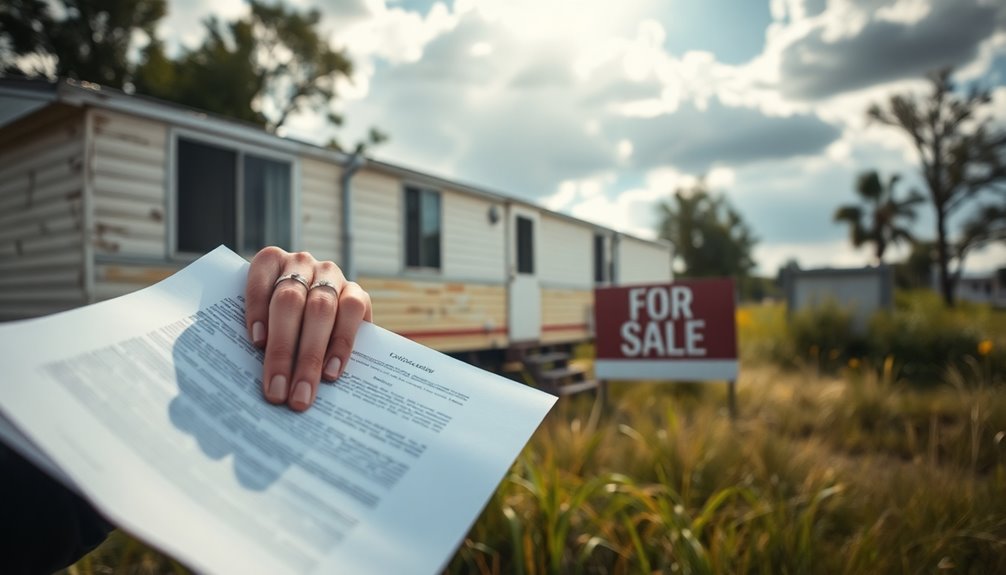
When buying mobile homes behind on taxes, it's crucial to consider various legal factors that can impact your investment.
First, be aware of tax liens, which can be placed on mobile homes just like traditional properties. If you purchase a tax lien certificate, you're responsible for the unpaid taxes plus interest. If the taxes remain unpaid, the property may be sold at a tax lien auction, potentially complicating your purchase.
Next, determine ownership and inclusion in a tax deed sale. Check if the mobile home is listed in the tax deed and if it's permanently affixed to the land. Look for utility connections and a 'Real Property' decal as indicators. Understanding the state-specific processes for tax lien certificates and tax deeds can help you navigate these complexities effectively.
Additionally, third-party interests such as mortgages or liens could affect your rights. Proper notice must be given before the tax deed auction for these interests to be extinguished. If the mobile home remains personal property, you might need a Quiet Title Action to establish ownership.
Finally, comply with local regulations concerning taxes. Understand the difference between sales/use taxes and property tax, and ensure you adhere to reporting requirements to local authorities.
Steps to Purchase Mobile Homes

After understanding the legal considerations involved in buying mobile homes behind on taxes, it's time to focus on the practical steps to make your purchase successful.
Start by assessing your needs and budget. Think about the location—do you prefer a quiet area or a lively community? Determine the size and layout that fits your lifestyle, including the number of bedrooms and bathrooms. Establish a budget that covers not just the purchase price but also lot rent, utilities, and maintenance costs.
Next, prepare financially. Get pre-approved for a loan to understand what you can afford. Review your credit report for any errors that could jeopardize financing. Compare loan options to find the best rates and terms, and save for a down payment to ease monthly payments. Additionally, it is crucial to monitor credit scores to ensure you secure favorable loan conditions.
Locate mobile home listings through parks, real estate agents, online searches, and community visits. Once you find a mobile home, conduct thorough inspections before making an offer.
Negotiate the purchase price and terms, obtain insurance coverage, and perform a final walkthrough. Finally, carefully sign the closing documents, ensuring you understand all terms before sealing the deal.
Risks Involved in Tax Sales

While buying mobile homes at tax sales can present lucrative opportunities, it's crucial to be aware of the inherent risks involved. First, outstanding liens and mortgages may survive the tax deed sale. This means you could inherit these debts, complicating your ownership. To avoid surprises, thorough research is essential.
Next, many properties at tax sales are distressed or abandoned, leading to substantial rehabilitation costs. You're responsible for addressing any property condition issues, which can include damage, vandalism, or even pest infestations. Inspecting the property before bidding is vital. Additionally, keep in mind that mobile homes on leased land are typically classified as personal property, which can further complicate ownership and tax responsibilities.
Legal errors can also pose significant risks. If the tax deed sale process doesn't adhere to state laws, minor mistakes could invalidate your purchase. Working with a real estate attorney can help ensure compliance and prevent ownership disputes.
Lastly, financial risks abound. The competitive nature of tax sales can lead you to overpay. Additionally, properties mightn't reach auction if taxes are paid or the homeowner files for bankruptcy. Always research past sales and market values to make informed bids, and factor in potential repairs and unpaid taxes into your budget.
Frequently Asked Questions
Can I Purchase a Tax Lien on a Manufactured Home in a Park?
Yes, you can purchase a tax lien on a manufactured home in a park, as long as it's subject to local property taxation.
During tax lien auctions, you'll have the opportunity to bid on these liens, becoming a lien holder. This means you can collect unpaid taxes plus interest.
Just remember, you won't gain immediate ownership; the homeowner has a redemption period to pay off the lien before any foreclosure actions can occur.
What Happens if the Original Owner Cannot Redeem the Property?
If the original owner can't redeem the property, you can apply for a tax deed after the redemption period expires.
This deed transfers ownership to you, clearing prior liens. You'll hold a certificate of sale initially, but once the period ends and no redemption occurs, you gain full ownership.
Keep in mind, any defects in the sale process might affect this, so it's wise to be aware of the legalities involved.
Are There Any Fees Associated With Bidding at Tax Sales?
Yes, there are fees associated with bidding at tax sales.
You'll often need to pay a non-refundable registration fee, which varies by location.
When you bid, be prepared to cover taxes and any premium fees if your bid exceeds the property's cash value.
After winning, you'll face payment deadlines and potential additional costs like certificate fees and interest.
Always check specific regulations to avoid surprises during the bidding process.
Can I Finance the Purchase of a Tax Lien?
You can't typically finance the purchase of a tax lien; it's usually a cash transaction.
When you participate in an auction, you need to pay the full amount of the unpaid taxes and any associated fees upfront.
This lack of traditional financing options means you'll need to have the cash ready.
How Do I Find Upcoming Tax Sales for Mobile Homes?
To find upcoming tax sales for mobile homes, start by checking your county's official website for listings and schedules.
Look for postings at local courthouses and tax offices as well. You should register with the county tax office or auction platform to receive notifications about sales.
Also, keep an eye on community boards and local newspapers for announcements.
Research properties thoroughly before bidding to ensure you understand any potential issues.
Conclusion
In conclusion, buying mobile homes behind on taxes can be a rewarding venture if you understand the process and stay informed. By grasping tax liens, state regulations, and the redemption period, you can navigate potential pitfalls and seize opportunities for financial returns. Just remember to consider the legal implications and risks involved. With careful research and due diligence, you can turn a neglected property into a profitable investment. Happy hunting!
